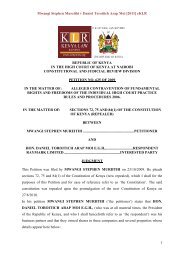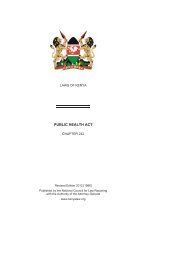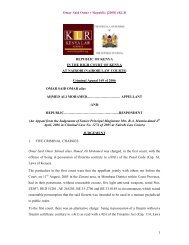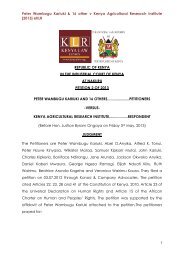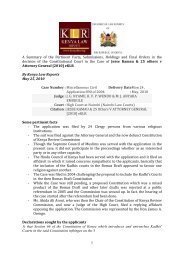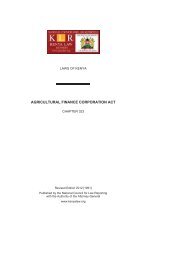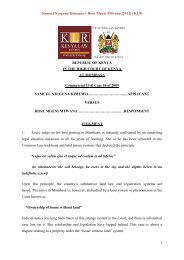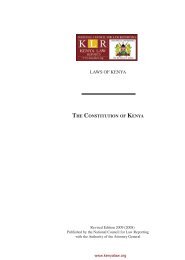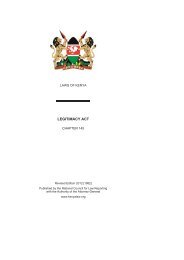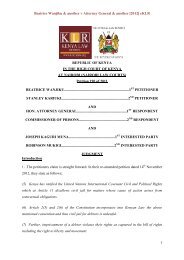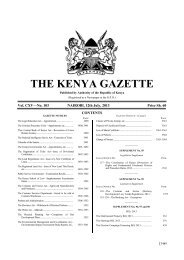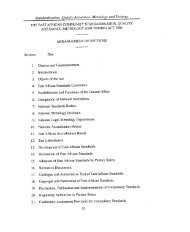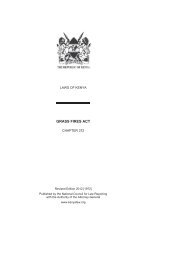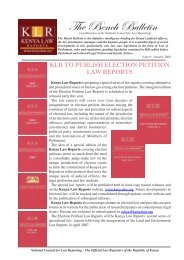Bench Bulletin - Issue 12 - Kenya Law Reports
Bench Bulletin - Issue 12 - Kenya Law Reports
Bench Bulletin - Issue 12 - Kenya Law Reports
You also want an ePaper? Increase the reach of your titles
YUMPU automatically turns print PDFs into web optimized ePapers that Google loves.
KENYA LAW REPORTS<br />
BENCH BULLETIN<br />
FROM THE COURTS — COURT OF APPEAL<br />
been fulfilled – whether a marriage between the respondent and the deceased could be presumed under section 3(5) of<br />
the <strong>Law</strong> of Succession Act Marriage – presumption of marriage - rationale and genesis of the concept of presumption of<br />
marriage - circumstances in which a presumption of marriage is deemed to arise – respondent having cohabited with the<br />
deceased for over fifteen years and had three children – evidence supporting that the deceased supported the respondent<br />
financially – lack of evidence that dowry was paid under the Kikuyu customs of marriage – whether a marriage could be<br />
presumed under such circumstances<br />
The High Court decreed that Esther Wanjiru Githatu (respondent/objector) and Mary Wanjiru Githatu (appellant/<br />
petitioner) be joint administrators of the estate of Ephantus Githatu Waithaka (the deceased). The High Court judgment<br />
had rendered that although there was no formal marriage between the deceased and the respondent, by virtue of their<br />
long cohabitation of fifteen years, recognition and acceptance by family members and friends, coupled with the birth<br />
of three children, the court declared the existence of a marriage by presumption and/or cohabitation between them.<br />
The Hon. Mr. Justice<br />
S. E. O. Bosire<br />
The appellant’s main ground of appeal was whether the respondent was a widow of the<br />
deceased within the meaning of section 3 (5) of the <strong>Law</strong> of Succession Act (Cap 160). The said<br />
section provides that the notwithstanding any other written law, a woman married under<br />
a system of law that permits polygamy is, where her husband has contracted a subsequent<br />
or previous monogamous marriage to another women, she will nevertheless be considered<br />
a wife for purposes of the Act.<br />
On appeal, the appellant’s advocate argued that the trial court in holding that petitioner was<br />
the widow of the deceased, based its decision on presumption of marriage. In his view the<br />
court erred in law and fact in failing to find that a common law presumption of marriage<br />
could not bring the petitioner within the provisions of section 3 (5) of the <strong>Law</strong> of Succession<br />
Act particularly having held that there was no valid Kikuyu customary law marriage between<br />
the petitioner and the deceased.<br />
On the other hand the respondent’s advocate relied on long cohabitation, the children the<br />
petitioner had with the deceased and other evidence to urge the court to presume a marriage<br />
between the deceased and the petitioner.<br />
Held:<br />
1. Whether or not a marriage could be presumed was a question of fact. It was not dependent on any system of law<br />
except where by reason of a written law it was excluded. The objector was married by the deceased under Kikuyu<br />
Customary <strong>Law</strong>. That being so and both sides conceded as much, the deceased had the capacity to enter into another<br />
marriage relationship provided the marriage was not a prohibited one.<br />
2. The marriage between the petitioner and the deceased was potentially customary in nature. The deceased according<br />
to Kikuyu customary law was obliged to pay dowry for the petitioner. As at the date of his death he had not done so.<br />
It however appeared to the court that if other essentials were satisfied but dowry was not paid, it may be paid even<br />
after one of the parties to the relationship was dead. Contrary to the objector’s submission it was in the circumstances<br />
as existed between the deceased and the petitioner in which a presumption of marriage may be raised.<br />
3. Long cohabitation as husband and wife may give rise to presumption of marriage in favour of the party asserting<br />
it, in the instant case, the petitioner (Hortensiah Wanjiku Yawe v The public Trustee). In view of section 3 (5) of the<br />
<strong>Law</strong> of Succession Act and the decision in Yawe vs. Public Trustee it was quite clear that the petitioner could in the<br />
circumstances of this case, be regarded otherwise than as the widow of the deceased.<br />
4. [per Nyamu J.A dissenting] The superior court decision was patently contradictory because it made a finding of<br />
the non-existence of a marriage under Kikuyu customary law between the petitioner and the deceased and at the same<br />
time declared a marriage by presumption, a concept which was a stranger in Kikuyu customary law.<br />
5. [per Nyamu J.A dissenting] A customary marriage is constituted by virtue of section 3(2) of the Judicature Act<br />
by the presence of the specified customary ingredients. It is a massacre of such a custom for anyone to suggest that a<br />
presumption of marriage per se can constitute a marriage under any system of law whether customary or common<br />
law unless it was accompanied by the other essential ingredients pertaining to a particular system of marriage. A<br />
presumption based on cohabitation remained a presumption but it could not constitute a customary law marriage<br />
without the essential ingredients. The presumption could not itself form the super structure of a Kikuyu customary<br />
law marriage or any other, it could only be part of the issue whether factually there was a marriage.<br />
6. [per Nyamu J.A dissenting] The petitioner was not married under a system of law contemplated under section 3<br />
(5) of the <strong>Law</strong> of Succession Act, therefore there was no marriage in terms of that provision.<br />
Appeal dismissed.<br />
Advocates<br />
1. Mr. Gicheru for the Appellant<br />
2. Mr. Machio for the Respondent<br />
<strong>Issue</strong> <strong>12</strong>: April-June 2010<br />
51



